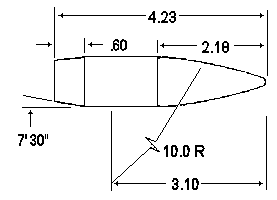Any one heard of this guy Brian Litz? He has developed a new way of measuring bc for bullets. I was wondering if the regularly used bullets by everyone on this forum could be calculated by this new method?
Is there a conversion chart available on the internet?
G7 ballistic coefficients
G7 ballistic coefficients
' Your here for a good time, not a long time'
-
Fred_C_Dobbs
- Senior Member
- Posts: 237
- Joined: Thu Oct 22, 2009 1:13 pm
- .204 Ruger Guns: Savage 12 Varminter Low Profile
Re: G7 ballistic coefficients
Last I heard, Litz was a ballistician for Berger Bullets. G1 and G7 (and all the other gees) are based on different modeling so AFAIK there is no conversion.
Re: G7 ballistic coefficients
I bought Litz' book "Applied Ballistics" a few months ago. He makes the math user-friendly. Worthwhile read, and he's got a mess of different bullets in it that he's tested and found BC's for.
Don't remember any .20 cal stuff though.
Litz has an impressive background as a long-range rifle competitor and seems to really know his stuff with his ballistics calculations as well.
Regards, Guy
Don't remember any .20 cal stuff though.
Litz has an impressive background as a long-range rifle competitor and seems to really know his stuff with his ballistics calculations as well.
Regards, Guy
-
Fred_C_Dobbs
- Senior Member
- Posts: 237
- Joined: Thu Oct 22, 2009 1:13 pm
- .204 Ruger Guns: Savage 12 Varminter Low Profile
Re: G7 ballistic coefficients
I should have posted this earlier. This is the exact shape and dimensions of the mathematical bullet used in G1 calculations:

It also actually was the shape an artillery round from the late 1800s.
This is the exact shape and dimensions of the mathematical model of a bullet used in G7 calculations:

Confucius told me I should post pictures in case there was any lingering confuciusism. The "R" in the picture stands of "radius" or 1/2 the bullet's diameter. Except for the angle of the boattail, everything else is expressed in some fraction of the radius.
I think it's pretty obvious that there's not much similarity in these two shapes, or in the drag that either will experience.
There's eight or ten different Geez now, covering the wide array of bullet shapes, starting with a round shot and going up to a high ogive number boattailed spitzer. But they're all just an edjumicated guess and if your bullet's proportions don't exactly match the model, neither will it's BC. Plus, BC changes with velocity and most bullet companies only give you one number, which is just an average that covers the velocities they figure that bullet will see most often.

It also actually was the shape an artillery round from the late 1800s.
This is the exact shape and dimensions of the mathematical model of a bullet used in G7 calculations:

Confucius told me I should post pictures in case there was any lingering confuciusism. The "R" in the picture stands of "radius" or 1/2 the bullet's diameter. Except for the angle of the boattail, everything else is expressed in some fraction of the radius.
I think it's pretty obvious that there's not much similarity in these two shapes, or in the drag that either will experience.
There's eight or ten different Geez now, covering the wide array of bullet shapes, starting with a round shot and going up to a high ogive number boattailed spitzer. But they're all just an edjumicated guess and if your bullet's proportions don't exactly match the model, neither will it's BC. Plus, BC changes with velocity and most bullet companies only give you one number, which is just an average that covers the velocities they figure that bullet will see most often.
-
giterdone
- Senior Member
- Posts: 196
- Joined: Sat Feb 14, 2009 7:30 pm
- .204 Ruger Guns: Savage 12LRPV-Savage 12VLP-T/C Encore SS all in .204 Ruger
- Location: Illinois (DuPage county)
- Contact:
Re: G7 ballistic coefficients
Rocket science tells me to use G1 for flat base bullets and G7 for boat tail bullets. 
John Moses Browning made the west safe for Winchesters